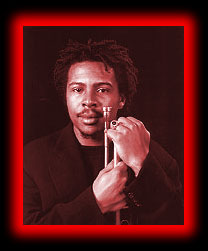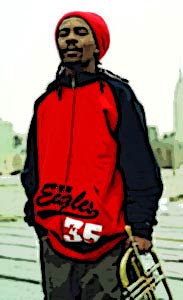
|
||
| Volume III, Issue II | Summer 2004 | |
| Summer 2004 Home Page |
| Culture/ Technology |
| Fiction |
| Music |
| Poetry |
| Theater |
| About / Contact |
| Archive |
| Current Home Page |
The lion in summer
Jazz trumpeter Roy Hargrove struggles to match early masterpieces
When jazz trumpeter Roy Hargrove first emerged in the early '90s, he was my favorite artist among the group then being hailed as "The Young Lions." Hargrove's alternately ferocious/mournful tone, slick-as-ice improvisations and downcast mood-weavage seemed to emanate from a dark, haunted and rare source of inspiration; perhaps the same well such diverse but brooding predecessors as Bird, Miles, Chet Baker and Art Pepper once drank from.
 Like fellow upstarts the Marsalis brothers, Joshua Redman, Cyrus Chestnut and Terrence Blanchard, Hargrove was grounded in straight-ahead bop tradition, but his playing was less pious than the stick-up-the-ass Wynton, more heartfelt than the gifted but sometimes curiously lightweight Branford and Redman, more focused than the wildly eclectic Chestnut and significantly more passionate than the always-brilliant but coolly intellectual Blanchard. I attributed the fact that Hargrove was less lauded than his leonine brethren to the very personality and idiosyncrasy that hallmarked his music as something genuine, essential; emotionally challenging but ultimately rewarding. Between 1992 and '94, Hargrove released a trilogy of albums ("The Vibe," "Of Kindred Souls" and "With The Tenors Of Our Time") that I believed laid the groundwork for a significant jazz legacy; perhaps the most important of the decade.
Like fellow upstarts the Marsalis brothers, Joshua Redman, Cyrus Chestnut and Terrence Blanchard, Hargrove was grounded in straight-ahead bop tradition, but his playing was less pious than the stick-up-the-ass Wynton, more heartfelt than the gifted but sometimes curiously lightweight Branford and Redman, more focused than the wildly eclectic Chestnut and significantly more passionate than the always-brilliant but coolly intellectual Blanchard. I attributed the fact that Hargrove was less lauded than his leonine brethren to the very personality and idiosyncrasy that hallmarked his music as something genuine, essential; emotionally challenging but ultimately rewarding. Between 1992 and '94, Hargrove released a trilogy of albums ("The Vibe," "Of Kindred Souls" and "With The Tenors Of Our Time") that I believed laid the groundwork for a significant jazz legacy; perhaps the most important of the decade.
Shortly thereafter, though, I felt Hargrove began to falter. 1994's "Approaching Standards" was a detached and disheartening wade into shallow waters, a collection of worn-to-death covers beneath Hargrove's heretofore cosmic dignity. 1995's "Parker's Mood," with virtuoso bassist Christian McBride and pianist Stephen Scott, was a noble but ultimately failed experiment; too self-consciously minimalist to do justice not only to the principals' immeasurable gifts, but Bird's own relentless fire, to which it presumed to pay homage.
 Last year, following a nearly five-year-hiatus from the studio, Hargrove released "Hard Groove" under the trendy new handle "The RH Factor," which may well go on to achieve status as the most controversial jazz release of this decade. Derided in hardcore jazzbo circles as a crass sell-out and lauded in more open-minded environs as a "new musical vision" ("All Music Guide"), the album is steeped in neo-r&b, funk and hip hop, and features collaborations with the likes of Erykah Badu, Q-Tip, Common, D'Angelo, Karl Denson and Me'Shell NdegéOcello.
Last year, following a nearly five-year-hiatus from the studio, Hargrove released "Hard Groove" under the trendy new handle "The RH Factor," which may well go on to achieve status as the most controversial jazz release of this decade. Derided in hardcore jazzbo circles as a crass sell-out and lauded in more open-minded environs as a "new musical vision" ("All Music Guide"), the album is steeped in neo-r&b, funk and hip hop, and features collaborations with the likes of Erykah Badu, Q-Tip, Common, D'Angelo, Karl Denson and Me'Shell NdegéOcello.
Naturally, I bloody hate the motherfucking thing. That said, I'll be frank enough to 'fess that I'm not one to impartially judge this sort of contemporary cacophony, and it's entirely possible that this moldy fig tendency precludes my recognition of this album as a contemporary equivalent to Miles' "Bitches Brew," similarly panned by outraged oldsters of the '60s but now widely accepted, even by myself (with some reservations due to its blatant self-indulgence), as a groundbreaking masterpiece.
So whither Roy Hargrove? At 33, the still-young lion has a lot of room to maneuver and find his way, whether that path pleases the likes of my surly old ass or not. And I maintain that, no matter what the future holds, Hargrove's early-'90s legacy remains beyond merely admirable. But, c'mon, man – Common? You know, Miles didn't invite Donovan to the "Bitches Brew" sessions, fr'fuckssakes.
![]()
Summer 2004 Music Section | Summer 2004 Main Page
Current Music Section | Current Home Page
Copyright ©
Reprinted by permission of author, who retains all copyright and control.